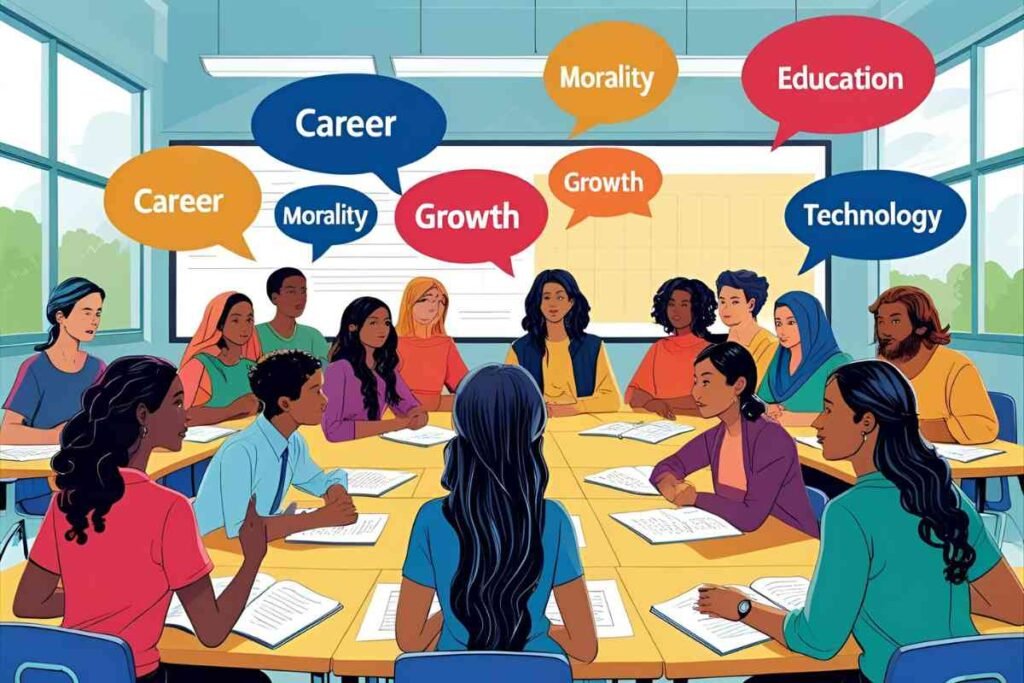What is aims of education? The aims of education are the guiding goals that shape learning helping students grow in knowledge skills and character.
They focus on developing the physical mental emotional moral and social abilities of an individual ensuring a balanced purposeful and meaningful life.
What is aims of education? you want to explore how these aims transform personal growth and society keep reading to discover more.
Defining What is aims of education?

When we ask What is aims of education? we are seeking to understand the guiding principles that define the role of education in human life.
What is aims of education? are the broader objectives that give direction to teaching and learning processes. They provide a framework for how knowledge skills and values should be transferred across generations.
At its core the aim of education is the full development of the individual. It strives to cultivate intellectual growth emotional intelligence ethical understanding and social responsibility.
Unlike short term educational goals which may focus on specific achievements the aims of education highlight the long term vision of shaping well rounded individuals capable of contributing meaningfully to society.
The Purpose Behind What is Aims of Education?
Education cannot exist without purpose and understanding What is aims of education? requires looking at the foundational goals.
The purpose of education is to prepare individuals not only for careers but also for life itself. It is about building citizens who are responsible ethical and equipped to face global challenges.
Education as Intellectual Development
A primary purpose of education is intellectual growth. By sharpening analytical skills improving reasoning and fostering creativity education ensures that learners can navigate an increasingly complex world.
What is aims of education? is not enough to memorize facts true education trains the mind to think critically and solve problems effectively.
Education as Moral Growth
Another essential aim is the moral and ethical development of individuals. Values such as honesty empathy and integrity are taught alongside academics.
By integrating moral education societies build compassionate and principled citizens who can make just and ethical decisions.
Education as Social Empowerment
Education empowers people to understand their roles as responsible citizens. It emphasizes civic responsibility respect for diversity and participation in democratic processes. By nurturing social awareness education strengthens the fabric of society.
Historical Perspectives on What is Aims of Education?
Throughout history the aims of education have been shaped by cultural political and philosophical contexts. From ancient civilizations to modern global systems the core principles have evolved but remain rooted in personal and social betterment.
Ancient Views of Educational Aims
In ancient India Greece and China education was deeply connected with philosophy and spirituality. It aimed to create balanced individuals with wisdom virtue and discipline.
For instance Plato emphasized education as a means to achieve justice and harmony in society while Confucius highlighted moral education as central to human development.
The Medieval Perspective
During the medieval period education focused largely on religious instruction. The aim was to cultivate piety obedience and respect for tradition. Knowledge was seen as a path to understanding divine truth and schools primarily served religious purposes.
Modern Educational Philosophy
In modern times the aims of education expanded to include intellectual freedom scientific inquiry and democratic values.
Thinkers like John Dewey argued that education should prepare learners for active participation in a changing world. The industrial age brought emphasis on vocational training while the digital era highlights adaptability and lifelong learning.
Core Objectives That Answer What is Aims of Education?
Understanding What is aims of education? involves recognizing its key objectives. These objectives serve as the building blocks for educational policies and practices worldwide.
Intellectual Development
Cultivating critical thinking creativity, and problem solving remains central. What is aims of education? the mind to question analyze and innovate which is essential for progress.
Personal Growth and Self Actualization
Education helps individuals discover their strengths and passions. By fostering self awareness and resilience it enables them to reach their highest potential.
Moral and Ethical Understanding
Teaching values and principles is crucial for creating responsible individuals who respect justice fairness and humanity.
Social and Civic Responsibility
Education prepares individuals to be active members of society. What is aims of education? encourages respect for diversity active citizenship and collaboration for common good.
Workforce Readiness and Economic Development
One of the modern aims is to align education with employment needs. By equipping students with practical skills education contributes to economic growth and innovation.
Importance of What is Aims of Education?
The question What is aims of education? is important because without clear aims education loses its sense of direction. The aims provide a vision for what learners should achieve and how education benefits society as a whole.
Enhancing Teaching and Learning
Teachers design curriculum and strategies based on defined aims. For example if creativity is an aim teaching methods will include open ended projects and inquiry based learning.
Guiding Policy and Reform
Educational policies are built around aims that reflect societal priorities. Governments use these aims to develop systems that prepare citizens for both national and global challenges.
Measuring Success in Education
Clear aims provide benchmarks for evaluation. By assessing whether learners achieve intellectual moral and social goals we can measure the effectiveness of educational systems.
Broader Global Scope of What is Aims of Education?
In the 21st century What is aims of education? have expanded to address global challenges. The interconnected world requires individuals who can think beyond local contexts.
Nurturing Global Citizenship
Global citizenship involves understanding international issues like climate change inequality and human rights. Education fosters empathy and collaboration across cultures preparing learners to solve shared problems.
Promoting Lifelong Learning
In today’s rapidly changing environment education is not limited to childhood or formal schooling. Lifelong learning ensures individuals continuously upgrade skills and adapt to new technologies.
Preserving Cultural Heritage
What is aims of education? looks forward it also safeguards traditions languages and values. By preserving culture education strengthens identity and fosters pride in heritage.
Statistical Insights into What is Aims of Education?
Research and statistics underline the importance of the aims of education. For example UNESCO reports that if all adults completed secondary education global poverty could be reduced by half.
Similarly the World Bank highlights that each additional year of schooling can increase income potential by 10 percent. These insights show how educational aims directly influence personal prosperity and societal development.
Challenges in Defining What is Aims of Education?

Defining what is aims of education? is not simple because different cultures societies and philosophies have their own perspectives.
Some view What is aims of education? mainly as a way to prepare students for jobs while others see it as a tool for moral and personal growth.
The rapid changes in technology and global needs also make educational goals harder to fix. Another challenge is balancing individual development with social responsibilities. Because of these diverse viewpoints there is no single universal definition of the aims of education.
Cultural Differences
Different societies prioritize different aims. Some may emphasize economic growth while others focus on spiritual or moral development.
Rapid Technological Change
With constant technological advancements education must adapt to prepare learners for jobs that do not yet exist.
Inequality in Access
Not all learners have equal opportunities to achieve the aims of education. Poverty gender inequality and lack of resources remain barriers.
Implementing What is Aims of Education? in Practice
To answer What is aims of education? it is not enough to define them they must be implemented effectively in classrooms and institutions.
Teacher Training and Professional Development
Teachers must be equipped to address diverse student needs and integrate innovative approaches to achieve educational aims.
Curriculum Design
Curriculums should reflect intellectual moral and social goals balancing academic content with practical life skills.
Community and Parental Involvement
Education thrives when families and communities actively participate. Collective effort ensures that learning extends beyond classrooms.
Leveraging Technology
Digital tools make education more accessible and engaging. Online courses interactive apps and AI driven learning support diverse aims.
While exploring What is aims of education? highlights the core purpose and direction of learning the guide on How CourseLinkFree.us Supports Lifelong Learning shows practical ways to achieve those aims through modern flexible education.
Conclusion
Understanding What is aims of education? helps us realize that education is far more than academics it is about shaping individuals into balanced capable and responsible human beings.
What is aims of education? develops knowledge skills values and creativity that guide personal growth and lifelong learning. At the same time it empowers society by fostering justice equality and progress.
Though cultural differences and rapid change bring challenges the universal vision remains the same: to prepare learners for meaningful lives.
By aligning teaching policies and communities with these aims education becomes a true force of transformation. Ultimately the aims of education inspire both individual fulfillment and collective advancement.
FAQs
What is aims of education?
The aims of education are the guiding goals that shape learning, focusing on intellectual, moral, social, and emotional growth. They ensure balanced personal development and prepare individuals for meaningful contributions to society.
Why are aims of education important?
Without clear aims, education loses direction. Aims provide a vision for teaching, learning, and policy, ensuring that students gain knowledge, values, and skills to succeed in life and strengthen society.
How do aims of education differ from educational goals?
Educational goals are short-term and focus on specific achievements, while aims of education are broader and long-term. Aims emphasize shaping well-rounded individuals who can grow personally and contribute socially.
What role does intellectual development play in the aims of education?
Intellectual development sharpens critical thinking, problem-solving, and creativity. It goes beyond memorization to equip learners with the ability to analyze, innovate, and adapt to an ever-changing world.
How does education contribute to moral growth?
Education nurtures values like honesty, empathy, and integrity. By blending academics with moral teaching, it builds responsible individuals who make ethical decisions and promote justice in society.
What are some global perspectives on aims of education?
Different cultures emphasize different aims—some focus on spiritual or moral development, while others highlight economic progress and innovation. Globally, aims now include lifelong learning, global citizenship, and cultural preservation.
What challenges exist in defining the aims of education?
Defining aims is complex due to cultural differences, rapid technological changes, and unequal access to education. Balancing individual growth with social responsibility remains one of the biggest challenges.
How can aims of education be implemented in practice?
Implementation requires well-trained teachers, effective curriculum design, community involvement, and the use of technology. These elements ensure that educational aims translate into real progress for learners and society.